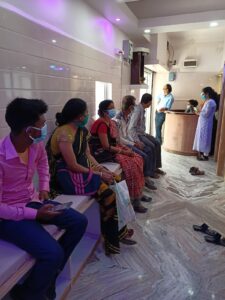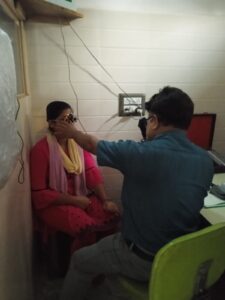Breast-milk and the Corona Vaccines : Research Report

Dr. Juni Banerjee , Neucrad Health, July 7, 2021
“It’s specifically designed by the mother, and by Mother Nature, to provide the child with the child’s first vaccine,” quoted Hedvig Nordeng, a specialist in medication uses and safety in pregnancy and lactation from the University of Oslo.
Human milk is unique for being not only a rich source of nutrients for their infant’s proper growth and development but also for the infant’s immunity. Breast milk through its secretory IgA antibodies and other bioactive factors protects infants against risks of infections. Since nursing babies with breast milk is highly recommended for at least the first 6 months, the ongoing vaccination against Covid-19 has made the scientists curious to check any connection between the Corona vaccines, lactating mother’s milk, and the effect on infant’s health!
Main Queries regarding Corona Vaccines and Breast Milk
Studies showed that corona-infected pregnant people, as well as lactating mothers, are getting more hospitalized as compared to corona-infected non-pregnant people. This data has profoundly prompted Covid-19 vaccination for lactating mothers.
However, scientists needed to answer the following major queries before encouraging to get vaccines to the lactating mothers-
1) What is the lactating individuals’ response to Corona vaccines?
2) Is there any indirect harm of the Covid-19 vaccine on the nursing infants (e.g. medications like aspirin can pass from the lactating mother’s milk to the infants even in diluted form and cause health problems)?
3) Do the corona vaccines provide any protection to the infants (like influenza vaccines)? and
4) In case they protect, how much protection infants receive from breast milk?
Important Research Works in this Matter
To look into the effects of Corona vaccines on breast milk, several research studies are being conducted, some of which are:
Kathryn Gray, a maternal-foetal medicine specialist at Brigham and Women’s Hospital in Boston (Massachusetts, USA), and her research colleagues examined 131 participants for Pfizer–BioNTech and Moderna vaccines. These 131 participants were about to get one of the 2 mentioned corona vaccines and were either lactating or pregnant or neither. They found that the lactating individuals showed similar levels of antibody responses as the non-lactating ones.
On further checking the breast milk samples of Corona vaccinated mothers, high levels of antibodies were found in all the samples. Surprisingly, unlike small molecules of alcohol and coffee that can pass into the breast milk at diluted levels, relatively larger antibodies also manage to pass into the milk. This is possible because of the milk duct’s cell surface receptors that grab these antibodies and pack them in protective fluid-filled bubbles to pass safely! “This process is so magical,” says Gray’s co-worker Galit Alter, the immunologist and virologist at Harvard Medical School in Boston, who worked on Gray’s study.

More data will soon arrive as Gray and her research group is tracking their participants.
The fact that lactating mothers receiving influenza-vaccine provide protection to their nursing infants (who are too young to get influenza vaccine) through the passed antibodies in their breast milk, encouraged scientists to check for the presence of antibodies in the breast milk of people who recovered from the SARS-CoV-2 virus too! Interestingly, some studies revealed that breast milk from those persons was oozing with antibodies
To check for the corona vaccine’s safety for the infants, So Gaw and her colleagues conducted a small study involving breast milk samples from 6 participants. These participants were either Pfizer–BioNTech or Moderna vaccinated and their breast milk samples were checked for up to 2 days. Fascinatingly, no trace of the mRNA in either case. The group is now trying to increase the number of participants to get more data and validate.
To check whether the detected antibodies in the breast milk are functional enough to destroy the SARS-CoV-2 virus, a research team from the Netherlands collected antibodies from the breast milk of Covid-19 recovered people. Interestingly, they found that the samples could neutralize the virus in the laboratory setting.
A month later, Young, Jarvinen-Seppo, and their research group found similar results too, following another study by scientists in Israel. They are all indicating that vaccine-induced antibodies of breast milk can prevent the virus from infecting cells and protect the babies.
The precise and exact duration to which these antibodies are produced from the vaccinated people is not known. However, a study involving 33 participants indicated that antibody production for the Moderna vaccinated adults continues for at least 6 months, meaning that babies receive good protection against SARS-CoV-2 for that long. However, scientists suspect that the antibodies get digested in the baby’s gut within some hours or days requiring the breastfeeding to be done at proper intervals and constantly for better results.
Conclusion
Studies, particularly with Pfizer-BioNTech and Moderna, revealed- a) a good immune response of the lactating mothers towards the vaccines b) no traces of the corona vaccine from the breast milk of the lactating mother c) presence of antibodies that have been passed from the vaccinated mother to provide a good level of protection to the infants against SARS-CoV-2 and d) no risks for active infection as these vaccines utilize mRNA (Unlike yellow-fever vaccines that involve a live, weakened form of the virus and makes the breast milk quite a risk for the infants) that also don’t get excreted into the breast milk.
Hence, lactating people may stop worrying and choose to be corona-vaccinated. Moreover, given that babies (0 to 2 yrs old) are not yet receiving corona vaccines in most places due to age issues, etc but at the same time are at more risk of getting hospitalized following Covid-19 than the older children, it is actually recommended to get vaccinated and not stop nursing the infants with breast milk.
References:
- Zipursky JS, Greenberg RA, Maxwell C, Bogler T. Pregnancy, breastfeeding and the SARS-CoV-2 vaccine: an ethics-based framework for shared decision-making. CMAJ. 2021 Mar 1;193(9):E312-E314. doi: 10.1503/cmaj.202833. Epub 2021 Jan 27. PMID: 33504561; PMCID: PMC8034306.
- Gray KJ, Bordt EA, Atyeo C, Deriso E, Akinwunmi B, Young N, Baez AM, Shook LL, Cvrk D, James K, De Guzman RM, Brigida S, Diouf K, Goldfarb I, Bebell LM, Yonker LM, Fasano A, Rabi SA, Elovitz MA, Alter G, Edlow AG. COVID-19 vaccine response in pregnant and lactating women: a cohort study. medRxiv [Preprint]. 2021 Mar 8:2021.03.07.21253094. doi: 10.1101/2021.03.07.21253094. Update in: Am J Obstet Gynecol. 2021 Mar 24;: PMID: 33758889; PMCID: PMC7987048.
- Perl SH, Uzan-Yulzari A, Klainer H, Asiskovich L, Youngster M, Rinott E, Youngster I. SARS-CoV-2-Specific Antibodies in Breast Milk After COVID-19 Vaccination of Breastfeeding Women. JAMA. 2021 May 18;325(19):2013-2014. doi: 10.1001/jama.2021.5782. PMID: 33843975; PMCID: PMC8042567.
- Davanzo R, Agosti M, Cetin I, et al. Breastfeeding and COVID-19 vaccination: position statement of the Italian scientific societies. Ital J Pediatr. 2021;47(1):45. Published 2021 Feb 27. doi:10.1186/s13052-021-00998-6
- Collier AY, McMahan K, Yu J, Tostanoski LH, Aguayo R, Ansel J, Chandrashekar A, Patel S, Apraku Bondzie E, Sellers D, Barrett J, Sanborn O, Wan H, Chang A, Anioke T, Nkolola J, Bradshaw C, Jacob-Dolan C, Feldman J, Gebre M, Borducchi EN, Liu J, Schmidt AG, Suscovich T, Linde C, Alter G, Hacker MR, Barouch DH. Immunogenicity of COVID-19 mRNA Vaccines in Pregnant and Lactating Women. JAMA. 2021 Jun 15;325(23):2370-2380. doi: 10.1001/jama.2021.7563. PMID: 33983379; PMCID: PMC8120446.
- Stuebe A. Considerations for COVID-19 Vaccination in Lactation. Breastfeed Med. 2021 Jan;16(1):2. doi: 10.1089/bfm.2020.29172.abm. Epub 2020 Dec 23. PMID: 33372846.
- Kasi SG, Dhir SK, Shivananda S, Marathe S, Chatterjee K, Agarwalla S, Verma S, Shah AK, Srirampur S, Kalyani S, Pemde HK, Balasubramanian S, Basavaraja GV, Parekh BJ, Kumar R, Gupta P. Breastfeeding and Coronavirus Disease 2019 (COVID-19) Vaccination: Position Statement of the Indian Academy of Pediatrics/Advisory Committee on Vaccination and Immunization Practices. Indian Pediatr. 2021 May 28:S097475591600336. Epub ahead of print. PMID: 34047719.
- Brillo E, Tosto V, Gerli S, Buonomo E. COVID-19 vaccination in pregnancy and postpartum. J Matern Fetal Neonatal Med. 2021 May 16:1-20. doi: 10.1080/14767058.2021.1920916. Epub ahead of print. PMID: 33998379.









